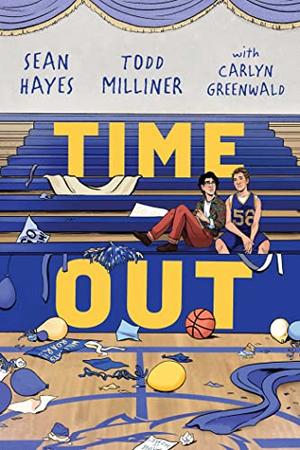Basketball defines Barclay Elliot. As captain of the Chitwood High School basketball team in Georgia, Barclay dreams of eventually putting his talent to the test at a big-city D1 school with his best friend Zack Ito. The protagonist in Time Out by Sean Hayes, Todd Milliner, and Carlyn Greenwald, Barclay believes that a team is a family who shares everything and supports one another; it is a place where talent, strength, and fortitude mix to hold one another up, no matter the burden. However, when his biggest fan and the father figure in his life, his grandpa Scratch dies before seeing the Wildcats win another championship beyond the one he helped the team win 50 years ago, Barclay is devastated by the loss and suddenly acutely aware of time’s limited and precious qualities. This awareness of time and the pressure of keeping a secret that is inextricably linked to his identity gives Barclay the courage to face his fears about revealing his sexuality, so he announces during a pep rally on his sixteenth birthday that he’s gay.
Given his beliefs and his “golden child” status, Barclay is unprepared for the shock and rejection he receives. Something positive was supposed to come from telling the truth. Instead, he is the recipient of bullying, homophobic slurs, and other acts of hatred that escalate until Barclay quits the basketball team.
Barclay is adrift and sinking until Amy Baltra and Christopher Dillon throw him a lifeline. Amy has a larger-than-life charm and gives her energy to causes that matter. Soon, the trio is fighting for social justice and equity in program funding so that all students can feel safe. Barclay discovers that corruption runs deep and that the basketball program has been the benefactor of skewed resources—resources that, spent where they should have been, may have saved his grandfather’s life.
Readers of Peter Cameron and David Levithan will likely enjoy this book where genres blur. Told in equal parts sports story, romantic comedy, realistic fiction, and social commentary, Time Out teaches us that nothing ever turns out the way we expect it to, that holding in pain doesn’t make it go away, and that finding joy in the midst of hell is possible. Through Barclay, the three authors remind us to love fiercely, face our fears, and pursue our passions “no matter if the faces that come out to see [us] are friendly or not” (258). After all, we can’t be bothered by people who hate us for something over which we have no control.
- Posted by Donna

